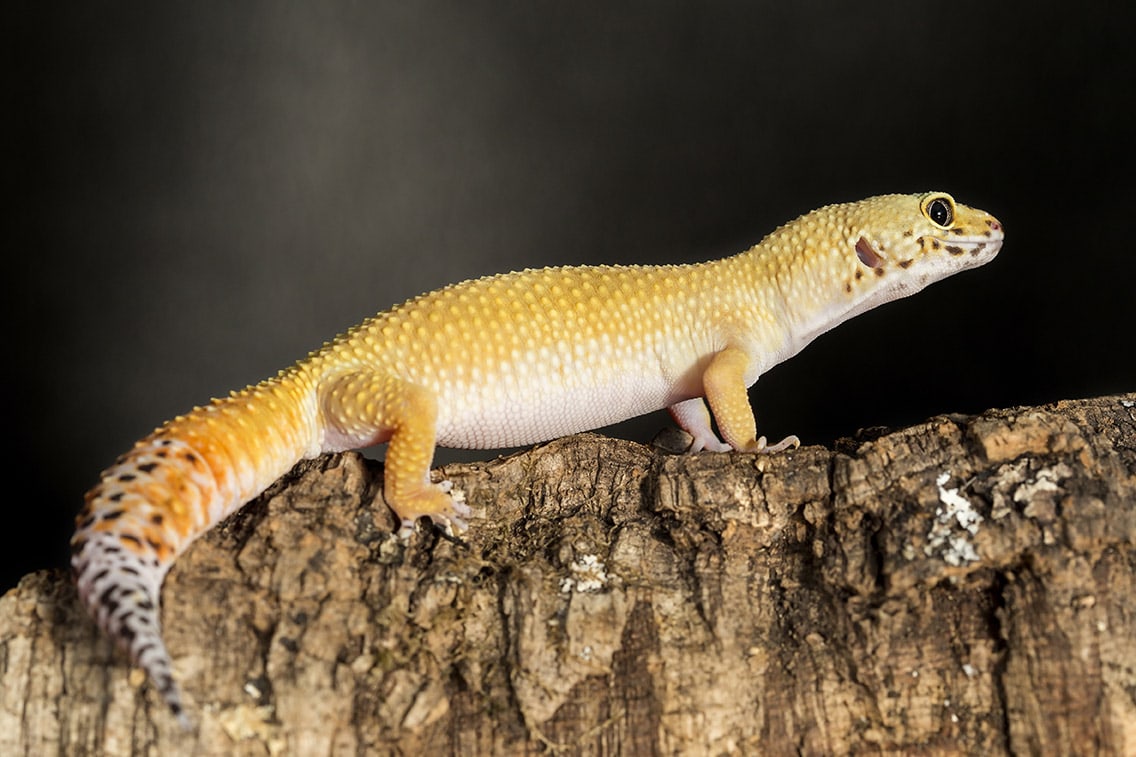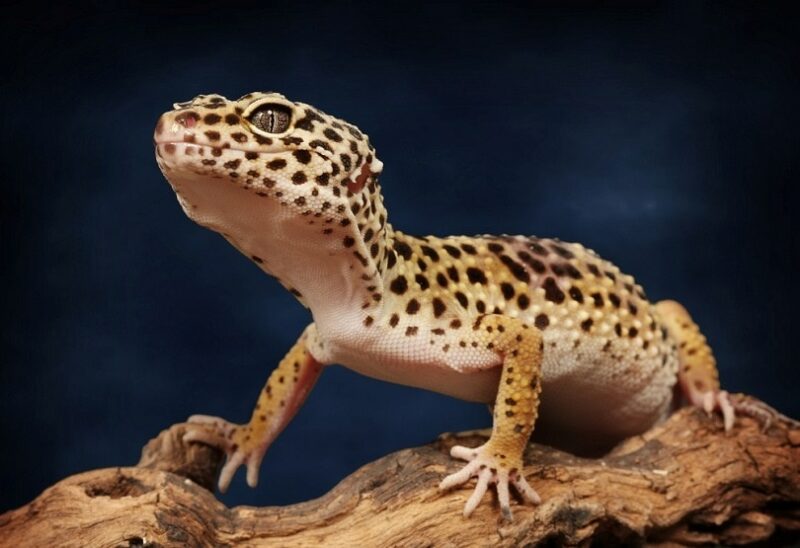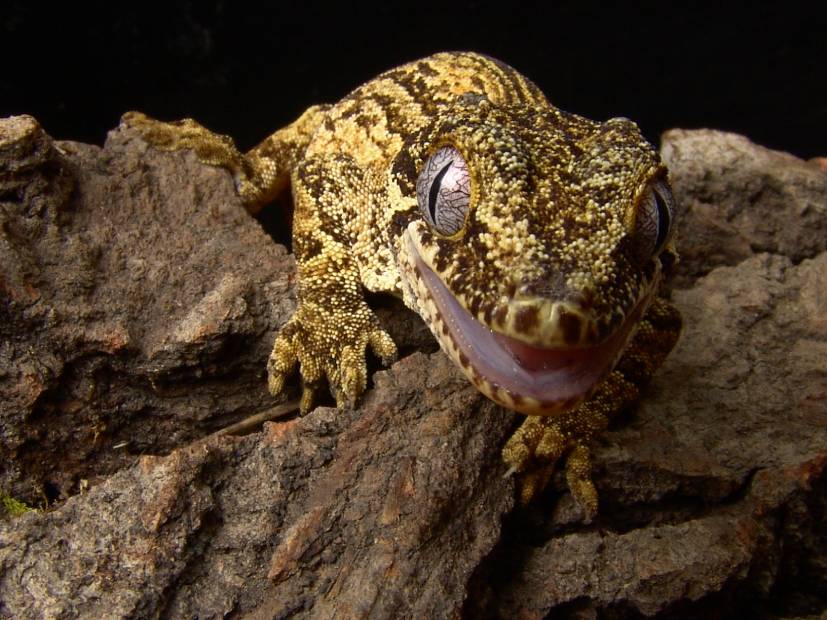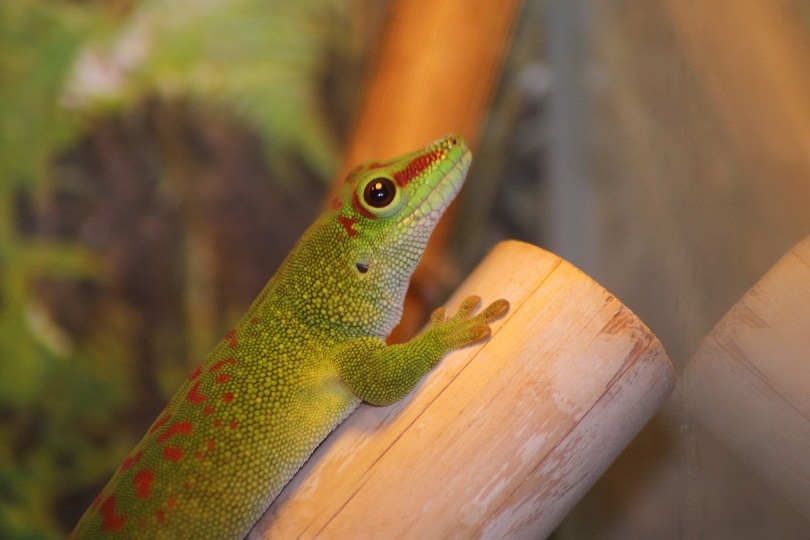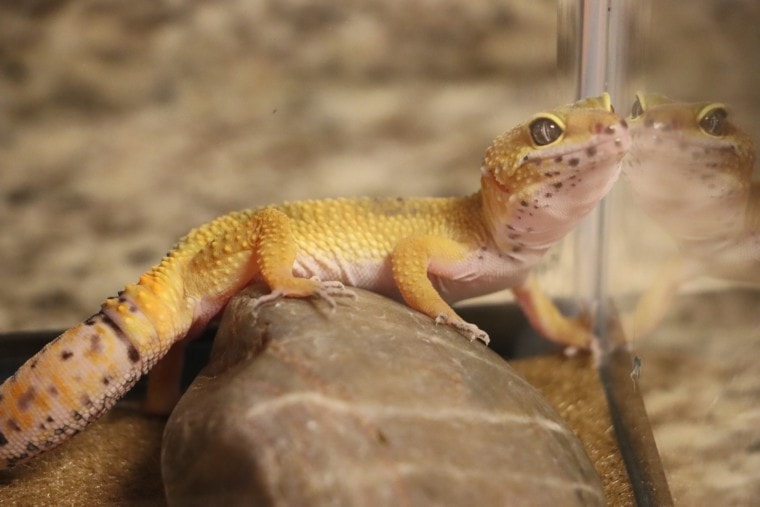
Just like any other animal, leopard geckos have ways to express their happiness or unhappiness. As a gecko owner, it is your responsibility to know the signs of an unhappy leopard gecko so that you can address the issue if it occurs.
Unfortunately, it can be a bit tough to tell if your leopard gecko is happy if you’ve never had one before. That is why we decided to write this article. By reading on, you can learn about five signs to look for to determine whether or not your leopard gecko is happy.
The 5 Signs Your Leopard Gecko Is Happy
Reptiles don’t have the same ability to be happy like us. With that being said, your leopard gecko’s happiness is mainly tied to its health. If your leopard gecko is sick, he is unhappy. In contrast, a healthy gecko is a happy one.
For this reason, determining whether or not your leopard gecko is happy involves looking at signs for illness or sickness. Let’s take a look at the most common signs that your leopard gecko is healthy, and therefore happy.
1. He is active.
The first sign that your leopard gecko is happy is that he is active. If your leopard gecko explores his tank, goes back and forth between the warm and cool spot, and approaches the glass whenever he is hungry or sees you, he is likely really happy. If he looks bright and alert, that is even a better sign.
In contrast, an unhappy leopard gecko will be really lethargic and sluggish. He may be sleeping or sitting with his eyes closed really often, and he will unlikely move around his tank.

2. He reacts to movements and being touched.
Another sign of a happy leopard gecko is that he reacts to movements and being touched. If your gecko responds every time you walk past the tank, he is alert and happy. He will especially be reactive whenever he is hungry. These are all key signs that your leopard gecko is happy.
An unhappy leopard gecko will stay still and not show many signs that he notices things around him. Despite this appearance, the gecko notices these things. He just doesn’t care to move, which is an alarming sign your gecko is unhappy.
3. His movements are smooth.
A happy gecko does more than just move, though. Instead, a happy leopard gecko will move rather smoothly. Smooth movements show that your leopard gecko is relaxed and not scared. A peaceful gecko is a happy one.
If your leopard gecko is making a lot of jerky movements, he is probably scared and unhappy. This is especially true if his tail is waving. Whenever a gecko waves his tail, it is essentially him telling you to back off from fear or stress.
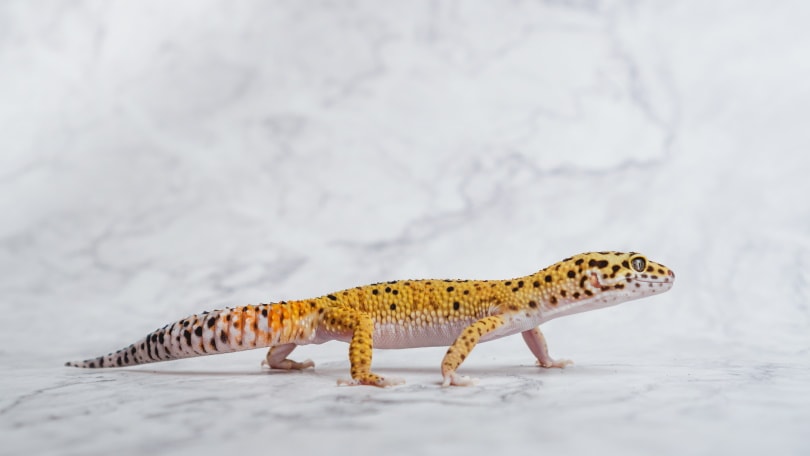
4. He eats a lot.
A happy gecko loves to eat. If your gecko looks forward to his meal and lets you know when he is hungry, you can trust that he is a happy and healthy boy. Continue to feed him as you normally do to continue his healthy diet and happy demeanor.
If you notice your leopard gecko is losing his appetite and doesn’t react to food, he is likely unhappy and sick. Take your leopard gecko to the veterinarian immediately if you notice a decreased appetite.
5. He has a healthy sleep cycle.
Finally, the last sign of a healthy gecko is that he has a healthy sleeping cycle. Happy geckos tend to sleep quite a bit. So, you should not be alarmed just because your gecko seems to sleep more than other animals in your home. At the same time, your gecko should have active times throughout the day.
Keep in mind that a sleeping gecko is not the same as a lethargic one. Once again, your leopard gecko is unhappy or sick if he is constantly lethargic and all the sudden sleeping more than normal.

What to Do About an Unhappy Leopard Gecko
As we already mentioned, an unhappy leopard gecko is an unhealthy one. If you notice that your leopard gecko is showing signs of being unhappy, you need to act. Here’s what to do if you suspect your leopard gecko is unhappy.
Take him to the vet.
First and foremost, make sure to take an unhappy leopard gecko to the vet. Especially if your gecko shows sign of lethargy and lack of appetite, there’s most likely a health issue to blame for your gecko’s unhappiness. An exotic vet will be able to pinpoint the reason and give you recommendations for treating your gecko.
Leave him alone.
In the case that your leopard gecko is simply flicking his tail every time you hold him, he probably doesn’t want to be handled. If you see no other signs of unhappiness, there probably is not a health issue to blame. Simply set your leopard gecko down and leave him alone so he can cool off.
Change his enclosure.
Oftentimes, geckos can become unhappy because of a stressful environment or situation. If this is the case for your gecko, simply change his enclosure to make the area less stressful. You may need to do this if the tank is too close to loud or active parts of the home. Putting the tank in a less stressful area should minimize your leopard gecko’s stress.
 FAQs
FAQs
Are leopard geckos happy in captivity?
The leopard geckos people have as pets today have been bred for captivity, resulting in many new colors and habits. As a result, the leopard geckos in captivity today are most likely happy and healthy. As long as your gecko is well fed and given a safe and clean environment, he is probably happy as a clam.
On the other hand, leopard geckos that are given poor diets and poor enclosures will be unhappy no matter what. This includes overfeeding or underfeeding your gecko, as well as providing it an unstimulating and unclean environment.
Can I hold my leopard gecko?
Most lizards are stressed when being held, but not leopard geckos. Most leopard geckos do not show any signs of stress from being held, meaning you can hold your leopard gecko. However, individual leopard geckos may like being held more than others.
Pay attention to your leopard gecko’s personality to determine how much you should hold it. One gecko may love being held, while the other might not like it.
You can get your leopard gecko acclimated to being held by warming your hands beforehand. Geckos love the feel of warm hands underneath their body. Additionally, slowly introduce juvenile geckos to your hand by placing it in their enclosure without touching them. This will show them that they have nothing to fear while being held.
Is my leopard gecko lonely?
No. Your leopard gecko is not lonely. Leopard geckos, and all reptiles for that matter, do not have the parts of the brain associated with understanding or needing social life. Because leopard geckos are not able to perceive of social life, they don’t get lonely either.
In fact, leopard geckos are incredibly solitary, and they can get injured and stressed if there’s more than one gecko in the enclosure. Feeding time will especially become tense if more than one gecko is in an enclosure at a time. We absolutely recommend keeping your leopard gecko on its own.
Is my leopard gecko bored?
Experts believe that leopard geckos need natural stimulation. As predators, they have evolved to be really active. If your leopard gecko has no form of stimulation, it very well may be bored. You can add stimulation to your leopard gecko’s tank by offering opportunities for it to hunt.
For example, you can use feeding tweezers to move the leopard gecko’s food around the tank, stimulating the experience of the hunt for the gecko. Be careful when using live insects, such as dubia roaches or crickets. Dubia roaches may burrow inside the tank, allowing them to live inside the tank unnoticed. Meanwhile, crickets will bite and can escape.
Does my gecko leopard love me?
Unfortunately, your gecko probably does not love you in the way that you love it. As we already mentioned, reptiles do not have the ability to be social, meaning it is impossible for them to understand love and social companionship.
With that being said, reptiles can learn who is a friend and who is not. By feeding your leopard gecko, you teach him that you are a friend. This will cause the leopard gecko to look forward to you with time.
Conclusion
A happy leopard gecko is a healthy one. Paying attention to your gecko’s eating habits, sleeping habits, and activity will show you whether or not your leopard gecko is happy. Most of the time, providing your leopard gecko with a good diet and clean enclosure will allow him to thrive and live a happy life, even on his own.
More interesting articles on geckos:
Featured Image Credit by: Pixabay

